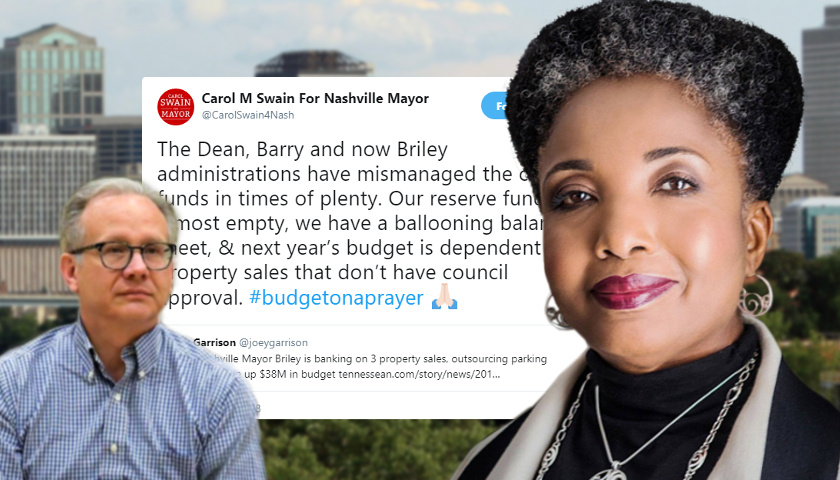Mayoral candidate Carol Swain came out swinging on Tuesday against Acting Mayor David Briley’s last minute proposal to come up with an extra $38 million shortfall in his proposed 2019 Metro Nashville budget by selling three existing properties currently owned by the Metro Nashville Davidson County Government.
Swain’s campaign issued its pointed response in a tweet on Tuesday morning:
The Dean, Barry and now Briley administrations have mismanaged the city’s funds in times of plenty. Our reserve fund is almost empty, we have a ballooning balance sheet, & next year’s budget is dependent on property sales that don’t have council approval. #budgetonaprayer ?? https://t.co/v8WokfOaB1
— Carol M Swain For Nashville Mayor (@CarolSwain4Nash) May 8, 2018
In an article titled “Mayor Briley is banking on land sales, parking overhaul to make up $38M in budget,” The Tennessean on Tuesday reported on Briley’s proposal, the details of which were apparently finalized over the weekend between his State of the Metro speech on Friday and the communication of the plan to the Metro Council on Monday:
Briley last week proposed a “status quo” $2.23 billion operating budget for the 2018-19 fiscal year that would be just a $22 million increase over the current year, meaning most departments would stay budget-neutral and the school system would get just a $5 million bump.
But even these modest enhancements are contingent on the property sales and a major overhaul of the city’s on-street parking operations. Each transaction is assumed in budget estimations, even though they lack Metro Council approval.
Metro Finance Director Talia Lomax-O’dneal identified the three properties in a memo to the Metro Council on Monday. The properties each involve abandoned Metro facilities in rapidly developing areas and are considered surplus. They are:
- The old Green Hills fire station at 2025 Richard Jones Road.
- Property at 3800 Charlotte Avenue that has an old Metro Public Works building.
- The old Murrell School building at 1450 14th Ave S. in Edgehill. The school was most recently used as a special-needs facility.
At least two members of the Metro Council appear to share Swain’s skepticism over Briley’s proposal and Metro Nashville’s overall financial management.
“It remains to be seen if this is a good business decision for Metro and not a ‘fire sale,’ ” At-large Council Member John Cooper told The Tennessean.
“The new fiscal year starts July 1, and this proposal is only in a draft (request for qualifications) stage. You have to worry that we will be rushed into a poor long-term business decision because of the current financial emergency,” Cooper added.
“People in Nashville are understandably angry about having a tight budget in boom times. But this storm has been brewing for a while,” At-large Council Member Bob Mendes wrote at his blog on Saturday, adding:
During each of the previous two budget cycles, I have also raised questions about how the percent of the budget that Nashville spends on long term debt could be increasing while we have been in boom times. If you get a raise from $50,000 to $55,000 per year, you’d like to see the part of your paycheck that goes to debt decrease, not go up!! Voters maybe haven’t known the exact numbers…but they have known that something wasn’t quite right.
Back in 2015, these issues concerned me and I told voters that they raised a yellow flag, not a red one, for me. I often said that there was plenty of time to address these issues and make a course correction. The efforts I am describing with legislation, and in encouraging dialogue and consensus on the flood wall before pulling the trigger on a $125 million project, and in talking about Metro’s $3 billion unfunded retiree benefits obligations have all been to nudge the city toward the course correction that we need.
For his part, Mayor Briley attempted to generate support for his 2019 budget proposal by sending out this tweet on Sunday:
We’re giving you 2 innovative tools to envision our budget. Our Balancing Act system will allow you to submit your own version of our FY2019 budget through 5/17. You can also see where your tax dollars are going through our Taxpayer Receipt system.
Visit https://t.co/r1wRIYg77Z pic.twitter.com/Ktixstxbbj— Mayor David Briley (@MayorBriley) May 6, 2018
Clicking through on the link, the site looks less like an “interactive site” designed for voter feedback than it does a promotional tool for “balancing the budget.”




